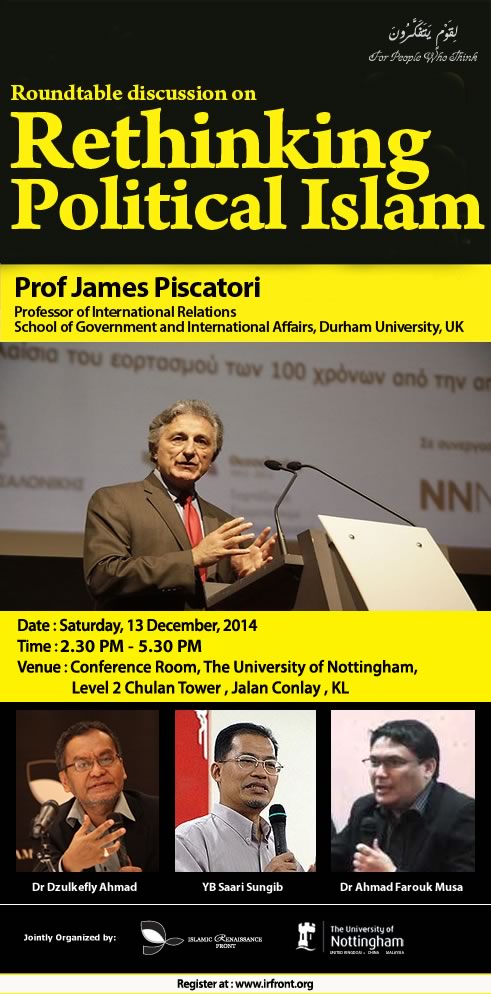
Date: Saturday, 13 December 2014
Time: 230PM-530PM
Venue: Conference Room, The University of Nottingham, Level 2 Chulan Tower, Jalan Conlay, Kuala Lumpur
Registration: http://www.eventbrite.com/e/roundtable-discussion-on-rethinking-political-islam-tickets-14895416592
Political Islam is generally linked to Islamism. Although the definition is sometimes blurred, it generally refers to ideologisation of religion and instrumental use of Islam in politics.
Actors in political Islam wish to articulate an Islamic ideology that could respond to their societies’ current political, economic and cultural deficits. They imagine Islam as a complete and ready-to-use divine system. In the words of Asef Bayat, this is a system that responds to all human problems and offers Muslims a sense of self-respect, self-confidence, and a discursive autonomy.
Islamists often argue that contemporary Muslims must return to the roots of their religion and be united politically. It entails a political ideology articulating the idea of the necessity of establishing an Islamic government that implements the sharia. They also aimed to apply sharia in full and to eliminate western influences in the Muslim world especially in the areas of politics, economy, society and culture, which they consider to be incompatible with the true and authentic Islam.
However critics have argued that despite the rejection of the West, the Islamists have not developed any alternative to modern state system, political economy and technology. And they have accepted to work within the boundaries of the nation-state despite their rhetoric of transnational claims. And the Islamists reinvention of religion as a political ideology and not a theological or socio-cultural construct provides the tools for dehistoricizing and decontextualizing Islam. So the challenge now is perhaps to reconsider political Islam in the new millennium.
This is where Asef Bayat coined the term “post-Islamism”. Bayat stated that “post-Islamism is not only a condition but also a project, a conscious attempt to conceptualize and strategize the rationale and modalities of transcending Islamism in social, political, and intellectual domains. Yet, post-Islamism is neither anti-Islamic nor un-Islamic or secular. Post-Islamism represents an endeavour to fuse religiosity with rights, faith and freedom, Islam and civil liberties, and focuses on rights instead of duties, plurality instead of singular authority, historicity rather than fixed and rigid interpretation of scriptures, and the future rather than the past.”
And this roundtable discussion will debate on this contentious issue of Rethinking Political Islam.
Programs
230-300PM: Registration
300-310PM: Welcoming speech by Prof Sean Matthews, Head of School, School of Modern languages and Cultures, University of Nottingham
310-320PM: Speech by moderator, Prof Zaharom Nain, Professor of Media and Communication Studies, Faculty of Arts, University of Nottingham
320-400PM: Speech by Prof James Piscatori, Professor of International Relations, School of Government and International Affairs, Durham University
400-410PM: Intervener 1: Dr Dzulkefly Ahmad
410-420PM: Intervener 2: YB Saari Sungib
420-430PM: Intervener 3: Dr Ahmad Farouk Musa
430-530PM: Discussion
530PM: Tea

